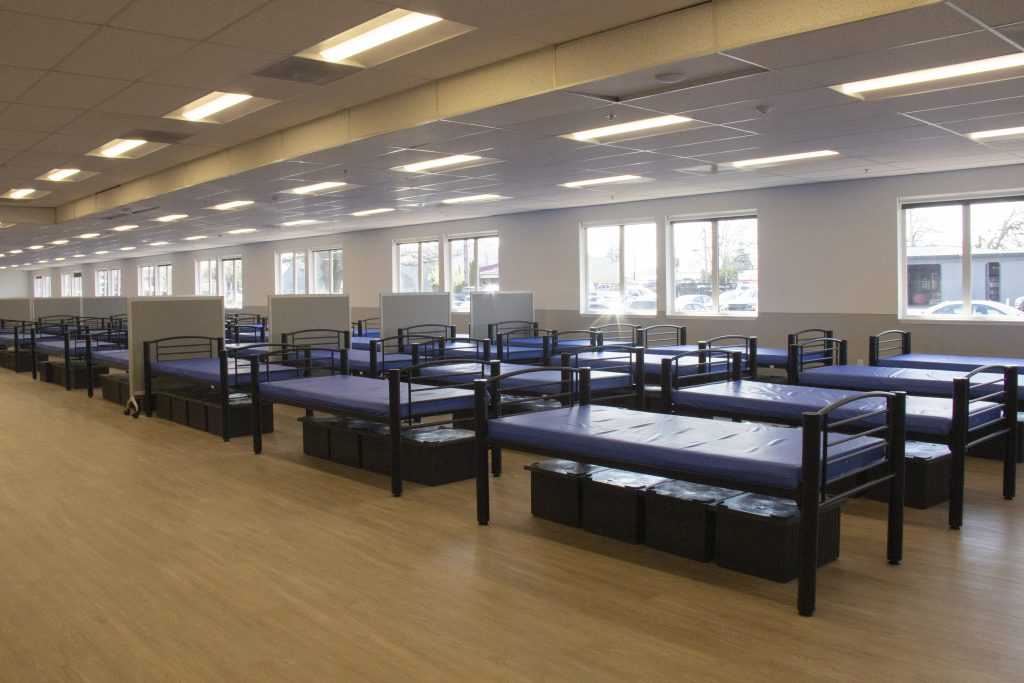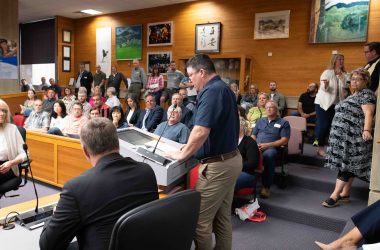Salemites may see more trash, slower emergency response times and the closure of the West Salem branch of the public library if voters fail to approve a new tax on wages in November.
That’s according to a new city report released Wednesday outlining proposed budget cuts over the next five years if the tax fails.
The Salem City Council will have a work session on Monday, Sept. 18, to hear the proposal and begin the conversation about changes to the budget.
“Obviously we’re not going to make any changes until November 8, when we know what the results of the election are, but we’re planning for that contingency and looking at what the impacts and ramifications would be to that,” City Manager Keith Stahley said.
That conversation starts Monday, when councilors will view a proposed list of specific cuts compiled through recommendations from city department heads. The proposal lays out cuts each year through 2028 to keep the city budget balanced without any additional revenue.
The meeting will be at 6 p.m. on Monday, Sept. 18, in the library’s Anderson Rooms, 585 Liberty St. S.E. It can be attended in person, or streamed on Capital Community Media’s YouTube Channel in English and with Spanish translation.
READ IT: Proposed cuts
Among the cuts are the closure of the West Salem branch of the public library and reduced hours and likely layoffs at the main branch, the city’s withdrawal from funding homeless shelters, cuts to police and fire positions and reduced upkeep at city parks.
With spending outpacing revenue at the current level of services, the city projects a deficit in funds by 2026 that would grow to $35.17 million by the 2028 fiscal year if the tax fails, and no other additional revenue is secured.
The city points to the state’s limits on property tax revenue in the 1990s and a population increase of over 26,000 since 2008 as leading to the gap between revenue and expenditures leading to the anticipated budget shortfall.
“When your revenues are constrained, and your expenses are mostly outside of your control – we can control how many people we have, we can’t really control how much those people cost,” said Josh Eggleston, the city’s chief financial officer. “So if we’re trying to solve for it we have two levers: we can reduce positions or we can increase revenues.”
The payroll tax, if approved, would bring in an additional projected $27.9 million per year, by taxing 0.814% of wages earned within Salem, with minimum wage earners exempt. A Salem worker earning the city’s average wage of $29.90 an hour would pay about $42 monthly. The city’s online payroll tax calculator provides a way to see how much would be paid by individual workers.
If approved, the city would sustain homeless shelters and add new police and firefighters, rather than make citywide cuts. The majority of payroll tax funds would go to sustain and expand staffing and services at the police department, fire department, and services for unsheltered people at the newly opened navigation center and micro shelters.
The proposed cuts would close the West Salem Library branch and reduce hours at the main branch, reduce services at Center 50+, reduce parks service and withdraw funding from city homeless services. It would also reduce a number of newly added positions in the next year, with potential layoffs to existing positions in future years.
The cuts were decided through trying to maintain core services critical to day-to-day operations, Stahley said, without eliminating services like parks and libraries entirely, Stahley said.
“We see and feel that there’s a lot of value with libraries and parks,” Stahley said. “Even for police and fire operations, our libraries are an important part of our community and wellbeing and without them I think we would see more impact and more activity in those areas as well.”
Stahley said the most impactful reductions have been staged for later years, to give the city time to seek alternative options and funding. The cuts would not be approved as a single package, rather guidance to consider and adjust each budget year.
“Josh’s job and my job is to keep the city financially solvent and that’s what we’re aiming for, here. There’s multiple ways to solve that equation, so we’ve put forward one option and obviously there’s a lot of other ways to get there,” Stahley said.
The payroll tax will undergo a vote in November. City leaders plan to have a revised budget for council and the budget committee to consider by January.
West Salem Library closure and fewer services
The library’s West Salem Branch is proposed to be closed by June 2024, which would cut off services including computers, a study area and shelter from the elements at the city’s only branch aside from the main library.
The branch is currently open five hours a day, five days a week, at a cost of $718,000 a year.
The city also proposed future cuts to library services starting July 2024, including the likely layoff of eight more employees. Library hours would be reduced by two hours a day, to 10 a.m. to 6 p.m. Tuesday to Saturday, with the library closing Sundays. Funds for library programs like the Reptile Man and story time would be halved, Eggleston said. The cuts total $1.17 million.
A newly added, vacant library supervisor position is also among the proposed cuts. The supervisor would have overseen employees, streamlined services and handled the circulation department.
Pull funding from homeless shelters

Starting in July 2024, the city would pull its support from micro shelter villages run by Church at the Park, which would cost the city $5.4 million. Catholic Community Services micro shelters provide up to 132 beds for children and families, and Village of Hope provides 80 adult beds.
The services help people transition out of homelessness, and guests used emergency services less with an 80% reduction to emergency room visits and a 75% reduction in 911 calls, according to Eggleston’s report.
Starting July 1, 2025, the city would pull its funding for the newly built Navigation Center, which was opened and started operating using Covid funds. The center provides shelter and connections to healthcare, employment and housing resources for up to 75 people.
The city proposed cuts to its emergency warming shelter program, which last year filled 2,572 beds over 35 days last winter, according to the staff report. The city would also cut its funding to Safe Park, which opened in late 2021 and has given 88 people access to bathrooms and a secure place to sleep so far this year. It is run by Church at the Park. Cuts to both programs totals $410,000.
The city also proposed eliminating its support for social programs like Center for Hope and Safety, Marion Polk Food Share and Northwest Human Services.
The city also proposed a $224,000 cut to the city’s youth development effort, ending its partnerships with the ILEAD Conference, the summer CARE Corps leadership development program and grants for unsheltered youth.
Cuts to parks
Parks would no longer have weekend maintenance and restrooms would close as part of $700,000 in proposed cuts to parks operations in the fiscal year starting July 1, 2024. Parks workers would stop watering the grass at neighborhood parks, close all drinking fountains and splash pads, and reduce maintenance of trails and vegetation.
The city proposed recovering $400,000 of the cut costs through increasing fees for sports programs, camps and for renting complexes. Nonprofit organizations would no longer be able to get waivers on park reservation fees.
Two unfilled park ranger positions that were planned to be added with the operations fee increase are also proposed to be cut. Currently, one park ranger patrols all city parks.
The council approved the fee increase when it approved the budget on June 12, which added $5.50 per month for residential homes, $4.40 per month for multi-family units and $26.51 for industrial, institutional and commercial properties.

Cuts to police
Proposed cuts at the police department’s drug enforcement unit would mean the police have limited ability to investigate high-level drug trafficking cases or investigate suppliers, with the police focusing on patrol.
The proposed cuts in 2024 include the vacant positions of two police officers, a lieutenant and a sergeant, totaling $916,000.
Starting July 2024, proposed cuts include eliminating a position from the police’s two-person team that removes and covers graffiti in Salem. In 2022, they addressed nearly 2,200 incidents, according to the report.
A newly added, vacant police crime analyst position is also among the proposed cuts in 2024. The analyst would have enhanced the collection and organization of crime data, and worked to analyze trends and patterns.
In the fiscal year starting July 2025, $2.4 million in cuts to the police department would reduce the budget by 10 officers, eliminate the second graffiti abatement position and a telephone reporting specialist. The staff would be moved to other positions, like patrol.

The move would cut the homeless services team, which works with the Salem Outreach and Livability Services Team and responds to camping complaints.
It would also cut the police team’s community action unit, which works to address livability concerns in the city. There would no longer be a team on bicycles, or rapid emergency response to city parks using the Utility Task Vehicle.
A newly added police crime analyst position is also among the proposed cuts, which would have enhanced the collection and organization of crime data, and worked to analyze trends and patterns.
Cuts to fire
Salemites would have to wait longer for help when they call 911 due to $1.9 million in proposed cuts starting in July 2025. The city would reduce the number of firefighters on duty per shift from 43 to 40 and increase the call volume load for other stations.
The cuts mean that only 51% of emergency calls in the city would be met within a 5.5 minute response time, according to the report. The city’s goal is to respond to 85% of calls within five and a half minutes. It currently meets that standard about two-thirds of the time.
A fire station closure proposed in 2027 would mean that only 43.8% of callers see a response within that time frame. Over 10,000 Salemites would not see an efficient response, according to the staff report.
Stahley said they will also not be building the two fire stations funded by the infrastructure bond voters approved last November in the foreseeable future.
“It doesn’t make sense to build fire stations that you don’t have revenue to operate. We may acquire the property so that we can put that in the bank, so to speak, but not build the facility,” he said.
A newly added fire training officer position is also proposed to be cut in 2024, which would have assisted in hiring, training, and meeting state and federal training requirements and standards. The current training division is overwhelmed and working overtime due to increased call volumes and staffing, according to Eggleston’s report.
Center 50+ reduction
Center 50+, which provides caregiving and services to older people in the community, would see a $400,000 cut, though the city is looking to cover half the loss through raising participation fees.
The cuts would limit the service’s ability to expand and do outreach, reduce weekend and evening programming and limit marketing.
Eliminate new positions
The proposal includes cutting 13 park rangers, code enforcement officers, an assistant city attorney, security guard and other new jobs that city officials had planned to add next year, recently budgeted for by the increase to the city’s operations fee.
“That was always predicated on a part-two of revenue happening, without that new revenue happening those positions are proposed to be reduced,” said Josh Eggleston, the city’s chief financial officer.
The recommended positions, being newly added, are still vacant. The cuts mean the city would continue at status quo levels which the city described as inadequate during budget committee meetings.
The proposed cuts of newly added operations fee funded positions include:
-Two code compliance officers, with the goal to have one officer per ward to address neighborhood issues.
-Four positions on Salem Outreach and Livability Services Team, which collects trash, responds to complaints and posts notices for unsheltered people. The additional staff would have brought their coverage from four days a week to seven. In the report, Eggleston said that staffing does not keep up with demand “despite averaging pulling about 22 tons per month of garbage throughout Salem.”
-A security officer at the Civic Center, one of two added to assist visitors and de-escalate potential issues. The proposal includes retaining one of the security positions added through the operations fee.
-A human resource business partner position, a finance analyst, an IT Supervisor and a legal assistant for the city attorney are all proposed as cuts. The positions would have improved city responses and processing time, according to Eggleston.
-Additional positions added into the general budget, which are vacant, include three human resources positions, three IT positions, a finance management analyst, a community services analyst and Urban Development analyst to support city initiatives and speed city processes.
Contact reporter Abbey McDonald: [email protected] or 503-704-0355.
SUPPORT OUR WORK – We depend on subscribers for resources to report on Salem with care and depth, fairness and accuracy. Subscribe today to get our daily newsletters and more. Click I want to subscribe!

Abbey McDonald joined the Salem Reporter in 2022. She previously worked as the business reporter at The Astorian, where she covered labor issues, health care and social services. A University of Oregon grad, she has also reported for the Malheur Enterprise, The News-Review and Willamette Week.









